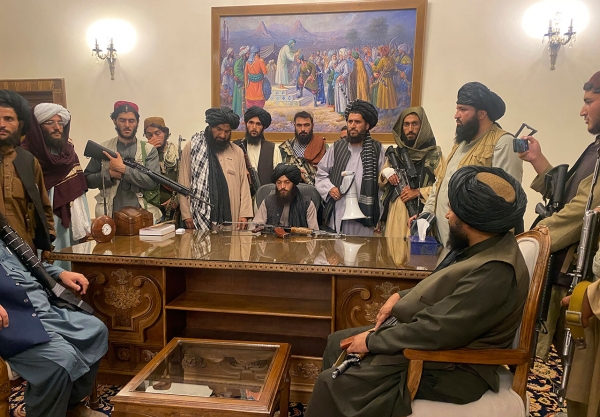
On Aug. 15, the Afghanistan government surrendered to the Taliban, and as a result the Taliban took control of the country. The two-decades-long war between the U.S. and Afghanistan ended when the president of Afghanistan fled abroad, and the last U.S. transport plane left Afghanistan on Aug. 30. Presently, the Taliban are in the process of establishing a new government.
The beginning of this war goes back 20 years. After the 9.11 attack shocked the world, the U.S. invaded Afghanistan in 2001 along with the North Atlantic Treaty Organization (NATO) in the name of eliminating Osama bin Laden, the suspected mastermind of the attack. The U.S. succeeded in taking over Afghanistan, eliminating bin Laden, and establishing a new government. However, they failed to completely oust the Taliban and were in a war of attrition for 20 years. Eventually, in February 2020, Donald Trump signed an agreement with Afghanistan, and finally, the war was won by the Taliban when the Biden administration withdrew its troops.
The Taliban’s control of Afghanistan is not unprecedented. The Taliban is an Islamic extremist militant group in Afghanistan that began its activities in the 1990s. They seized control of Afghanistan in 1996 and ruled until 2001. The Taliban’s first period of rule was tyrannical. The Taliban regime was a torment not only for those who resisted the Taliban but also for women. As if the Taliban were aware of it, a spokesman told a press conference, “We are very different now than we were 20 years ago,” and said, “No one will get hurt in Afghanistan.” However, it turns out that nothing has changed. Women are oppressed without freedom, and the lives of Afghans who cooperated with the U.S. and other countries are being threatened. Women are protesting against gender discrimination, but the Taliban are readily cracking down on them.
As a result, many countries tried to evacuate embassy employees. Korea also succeeded in helping ambassadors escape from Afghanistan on Aug. 16. The “Miracle” operation later rescued Afghans who had cooperated with the South Korean government and transported them to Korea. They are currently living in Korea as a “special contributors”, rather than as a refugee. However, further rescue efforts are expected to be difficult as all countries have declared an end to their rescue operations, following a bombing at Hamid Karzai International Airport on Aug. 26.
Meanwhile, the Taliban’s rule is expected to create a stir in the international community. First, China is approaching the Taliban regime for economic and security advantages. The Chinese government is expected to seek to secure rare earth elements buried in Afghanistan for their IT companies. Afghanistan could also act as a security threat. Jonathan Marcus, a former diplomatic correspondent of the BBC, said “China shares a short border with Afghanistan. It is actively persecuting its own Muslim minority and must be concerned at the possibility that anti-Beijing Islamist terrorists might seek to use Afghanistan as a base.”
On the other hand, the U.S. is expected to suffer. First, the U.S. military and NATO only partially achieved their purpose, which has led to criticism of the legitimacy of the war. They only succeeded in killing bin Laden, but neither established a democratic government in Afghanistan nor ousted the Taliban altogether. In addition, preventing Afghanistan from becoming a hotbed of extremism is pointed out as a new challenge for the United States. Concerned by the U.S., the Taliban promised that extremist groups would not be allowed to use Afghanistan as a base to direct attacks on the U.S. and its allies. However, just by looking at the terror attacks at Kabul airport, it is assumed that the groups involved have already entered Kabul and are active.
These days, the Taliban are facing disputes with Islamic State Khorasan (IS-K). IS-K is an affiliated branch of IS and aims to spread Islam around the world, unlike the Taliban’s goal of controlling Afghanistan. As a result, when the Taliban signed an agreement with the U.S., they were at odds, saying the Taliban neglected the Islamic duty of Jihad. Their conflict began in earnest when IS-K committed a terror attack at the airport, and the Taliban retaliated by killing an IS-K leader imprisoned in Kabul. According to an analysis by experts, IS-K’s main goal seems to be to undermine the Taliban’s trust and hinder stability in the Afghan state. The confrontation between the two groups is expected to continue for the time being, and the threat of terrorism is also expected to continue.
The Taliban’s rule foreshadows a variety of issues, including refugees, human rights, and discrimination between men and women. Plenty of attention will be drawn to the response of the international community.


